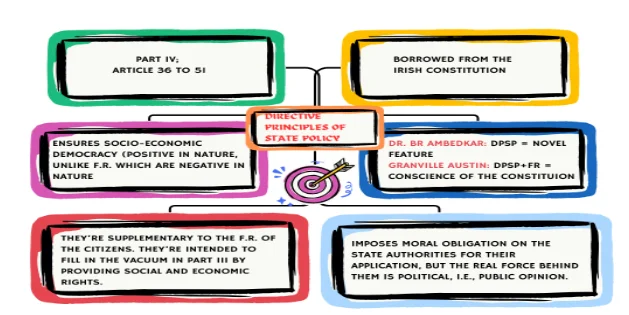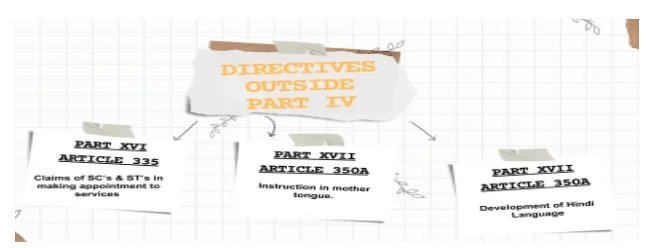The Directive Principles of State Policy (DPSP), outlined in Part IV of the Indian Constitution (Articles 36-51), guide government actions to foster a just and equitable society. Although non-justiciable, these principles are crucial for shaping policies and ensuring socio-economic welfare. They aim to realize the ideals of justice, liberty, and equality, contrasting the colonial-era ‘Police State’ with a modern ‘Welfare State.’
Directive Principles of State Policy (DPSP)

Enroll now for UPSC Online Course
Nature of DPSP
-
- Resemble with Instrument of Instructions
- Dr. B.R. Ambedkar aptly noted that “the Directive Principles are like the instrument of instructions,” which were issued to the Governor-General and Governors of the British-India by the British Government under the Government of India Act of 1935.
- The key difference is that these principles now serve as instructions to the legislature and the executive.
- Promote Comprehensive Goals for a Democratic State: Comprehensive Program for a Democratic State: The Directive Principles encompass a comprehensive economic, social, and political program for a modern democratic State.
- Realizing Constitutional Ideals: Their aim is to realize the ideals of justice, liberty, equality, and fraternity as outlined in the Preamble to the Constitution.
- Concept of a ‘Welfare State’: They embody the concept of a ‘Welfare State,‘ which is distinct from the ‘Police State’ of the colonial era.
- Establishing Economic and Social Democracy: Essentially, they seek to establish economic and social democracy in the country.
- Non-Justiciable Nature: Directive Principles are non-justiciable, meaning they are not legally enforceable by the courts for their violation.
- Fundamental Role in Governance: However, the Constitution (Article 37) emphasizes that these principles are fundamental in the governance of the country, and it shall be the duty of the State to apply these principles in making laws.
- Resemble with Instrument of Instructions
- Constitutional Validity Determination: Despite being non-justiciable, the Directive Principles assist the courts in examining and determining the constitutional validity of a law.
-
- Balance Between Fundamental Rights and DPSPs: In the Minerva Mills case, the Supreme Court held that there is a need to maintain a delicate balance between fundamental rights and DPSPs.
- Reasonableness of Laws Aligning with DPSPs: The Supreme Court has consistently ruled that when assessing the constitutionality of any law, if the law aligns with a Directive Principle, it may be deemed ‘reasonable’ concerning Article 14 (equality before the law) or Article 19 (six freedoms), thereby saving such a law from unconstitutionality.

Features of Directive Principles of State Policies
Article 36: Definition- In this Part, unless the context otherwise requires, “the State” has the same meaning as in Part III.
- As per Part III Article 12, “The State” includes the Government and Parliament of India, the Government and the Legislature of each of the States, and all local or other authorities within the territory of India or under the control of the Government of India.
- Article 37: Application of the principles contained in this Part—The provisions contained in this Part shall not be enforceable by any court, but the principles therein laid down are nevertheless fundamental in the governance of the country, and it shall be the duty of the State to apply these principles in making laws.
- Role of DPSPs in Just Governance: In our legal system, DPSP serves as the cornerstone for just governance, ensuring the integration of socio-economic justice into policies.
- Though non-justiciable, their moral imperative drives ethical governance.
- State’s Responsibility and Implementation: Despite lacking legal enforceability, DPSP emphasizes the State’s responsibility to convert principles into actions, directing resources and efforts to promote justice, equality, and opportunities for all citizens.
- Example: Universal Primary Education: Every year, many children in India are forced into child labour due to poverty, depriving them of an education.
- Although initially thought unfeasible, universal primary education became a fundamental right (Article 21A) as progress was made.
- Now, primary education is a fundamental right (Article 21A), symbolising hope for children of age 6 yrs to 14 yrs.
- DPSPs and Social/Economic Democracy: While Part III (Fundamental Rights) guaranteed political democracy, Part IV (DPSPs) ensured social and economic democracy, bridging the gaps for marginalized sections.
-
- This pivotal constitutional provision mandates the State to uplift the underprivileged, fostering an inclusive society where every citizen has equal opportunities, marking a crucial step towards a more just and equitable nation.
Constitutional Articles Related to DPSP
| Article Number | Subject Matter |
| 36 | Definition of State |
| 37 | Application of the principles contained in this part |
| 38 | State to secure a social order for the promotion of welfare of the people |
| 39 | Certain principles of policy to be followed by the state |
| 39A | Equal justice and free legal aid |
| 40 | Organisation of village panchayats |
| 41 | Right to work, to education and to public assistance in certain cases. |
| 42 | Provision for just and humane conditions of work and maternity relief |
| 43 | Living wage, etc., for workers |
| 43A | Participation of workers in the management of industries |
| 43B | Promotion of co-operative societies |
| 44 | Uniform civil code for the citizens |
| 45 | Provision for early childhood care and education to children below the age of six years. |
| 46 | Promotion of educational and economic interests of Scheduled Castes, Scheduled Tribes, and other weaker sections |
| 47 | Duty of the State to raise the level of nutrition and the standard of living and to improve public health. |
| 48 | Organisation of agriculture and animal husbandry |
| 48A | Protection and improvement of environment and safeguarding of forests and wildlife |
| 49 | Protection of monuments and places and objects of national importance |
| 50 | Separation of judiciary from executive |
| 51 | Promotion of international peace and security |
Directive Principles Added Through Constitutional Amendment
| Constitutional Amendments | Article Numbers | Article |
| 42nd Amendment Act, 1976 | Article 39(f) |
|
| Article 39A |
|
|
| Article 43A |
|
|
| Article 48A |
|
|
| 44th Amendment Act, 1978 | Article 38 |
|
| 86th Amendment Act, 2002 | Article 45 |
|
| 97th Amendment Act, 2011 | Article 43B |
|
Directive Principles Outside Part IV
In addition to the Directive Principles enshrined in Part IV of the Indian Constitution, there are also Directives scattered throughout other parts of the Constitution:
- Claims of Scheduled Castes and Scheduled Tribes (Article 335)
- It is found in Part XVI, mandates that the government consider the claims of Scheduled Castes (SCs) and Scheduled Tribes (STs) when making appointments to public services and posts.
- This directive aims to ensure equitable representation and promote social justice.

- Instruction in Mother Tongue (Article 350-A)
- It is located in Part XVII, and directs states and local authorities to provide adequate facilities for instruction in the mother tongue at the primary education level for children belonging to linguistic minority groups.
- This principle safeguards the linguistic rights of minority communities and promotes cultural preservation.
- Development of the Hindi Language (Article 351)
- It is found in Part XVII, places a duty on the Union to promote the spread and development of the Hindi language, enabling it to serve as a unifying medium of expression for India’s diverse cultural tapestry.
Enroll now for UPSC Online Course
| Must Read | |
| Current Affairs | Editorial Analysis |
| Upsc Notes | Upsc Blogs |
| NCERT Notes | Free Main Answer Writing |
Conclusion
DPSPs are fundamental in shaping India’s governance, even though they are not legally enforceable.
- They serve as a moral compass for policymakers, guiding them towards creating a fair and inclusive society.
- By integrating these principles into laws, India strives to balance individual rights with social and economic justice, driving the nation towards comprehensive development and equality.
Sign up for the PWOnlyIAS Online Course by Physics Wallah and start your journey to IAS success today!
| Related Articles | |
| Indian Constitution | The Government of India Act, 1935 |
| Economy | Directive Principles of State Policy |

 GS Foundation
GS Foundation Optional Course
Optional Course Combo Courses
Combo Courses Degree Program
Degree Program









